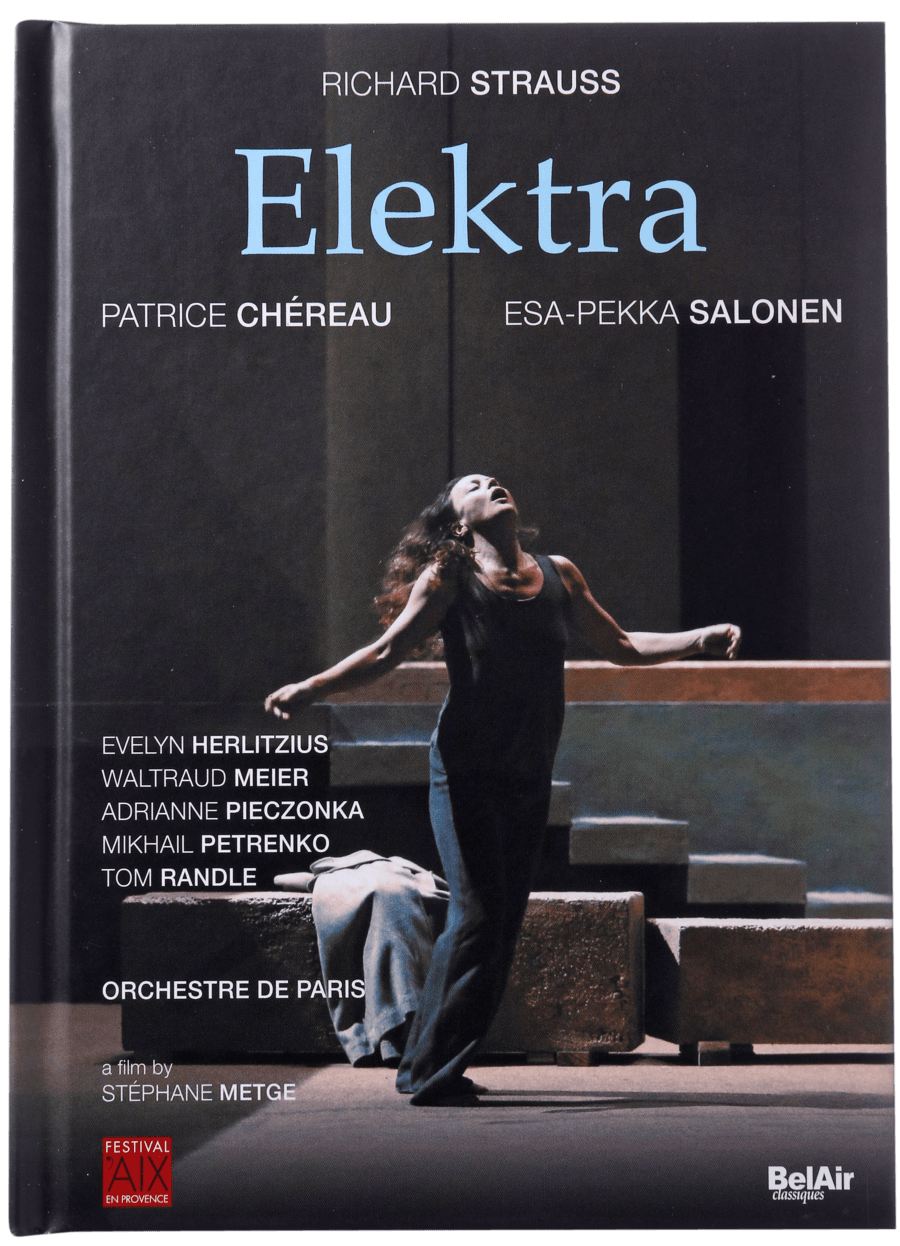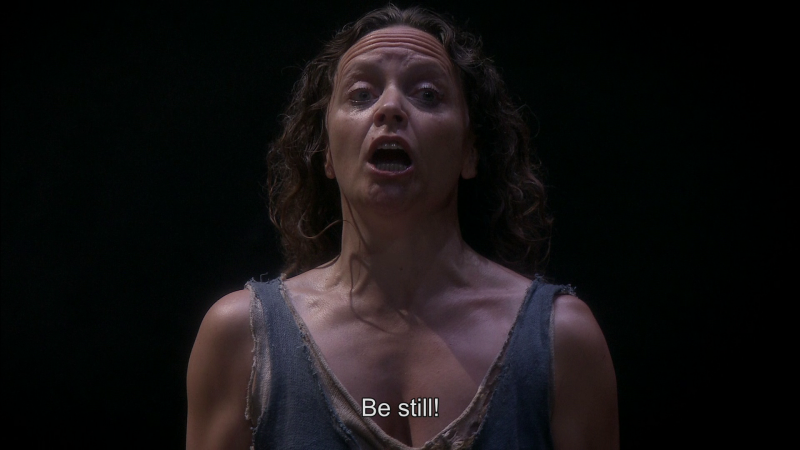Richard Strauss Elektra opera to a libretto by Hugo von Hofmannsthal. Directed 2013 by Patrice Chéreau at the Aix-en-Provence Summer Festival. Stars Evelyn Herlitzius (Elektra), Waltraud Meier (Klytämnestra), Adrianne Pieczonka (Chrysothemis), Mikhail Petrenko (Orest), Tom Randle (Aegisth), Franz Mazura (Tutor of Orest), Florian Hoffmann (A Young Servant), Donald McIntyre (An Old Servant), Renate Behle (The Overseer/Confidant), Bonita Hyman (First Maid), Andrea Hill (Second Maid/Trainbearer), Silvia Hablowetz (Third Maid), Marie-Eve Munger (Fourth Maid), and Roberta Alexander (Fifth Maid). Actors are Christine Cardeur, Ana Gabriela Castro, Julie Denisse, Félix Martinez, Amandine Molla-Barré, and Marie Vires. Esa-Pekka Salonen conducts the Orchestre de Paris and Coro Gulbenkian. Sets by Richard Peduzzi; costumes by Caroline de Vivaise; lighting by Dominique Bruguière; wigs and makeup by Campbell Young; dramaturgy by Vincent Huguet. Directed for TV by Stéphane Metge; produced by François Duplat. Sung in German. Released 2014, disc has 5.1 dts-HD Master Audio sound. Grade: B
This title is a joint project of a kind of opera NATO: The AIX Festival (France), Teatro alla Scala (Italy), the Met (USA), Teatre del Liceu (Spain), Staatsoper unter den Linden (Germany), and the Finnish National Opera. The support was there to do it right. The director added 6 stage actors to the 14 credited singers. The Orchestre de Paris numbered 101 + conductor and there was a chorus of 24.
In the May, 2014 Opera News Brian Kellow wrote a glowing article about the Aix-en-Provence Summer Festival (page 16). Here's a comment he made about this Elektra at Aix in 2013: "The season's operatic highlights included . . . what turned out to be Patrice Chéreau's swan song, an Elektra of such profound simplicity and dramatic specificity that I count it among the handful of unqualifiedly great operagoing experiences of my life." Opera News calls this one of the 5 best opera Blu-rays for 2014 (January 2015, at page 51). Finally, Gramophone in September 2015 (page 35) calls this one of the three best opera recordings of 2015 (all 3 shortlist recordings were videos published in Blu-ray).
Chéreau, an experienced movie director, set out to make a film as well as produce an opera. Stéphane Metge filmed during rehearsals (including sessions when cameramen were allow to work on stage) and shot the live productions at the festival. The result was a record of an opera performance (with curtain calls) plus a motion-film version of the Strauss Elektra. Alas, there are 2 problems with the film that home theater viewers should be aware of. First, the film is dark. Second, the English subtitles are atrocious.
I can't think of any motion picture, not even from film noir or say, Italian post WWII realism, that is so grim as this Elektra. The resolution is soft throughout. Still, with my calibrated plasma display in an almost blacked-out room, I was able to see what Chéreau and Metge wanted to get across. The aura of ancient gloom is part of their concept. Still, if there is ambient light in your home theater, you may have trouble enjoying this. If you have a projector, you may need a fresh bulb.
The low light made it impossible to get screenshots from much of the film that could be seen on a PC monitor. I did salvage some shots from scenes that take place per the libretto in daylight. The action is set in the servants' courtyard at the rear of the palace that once belonged to the murdered King Agamemnon. In my first screenshot, there is a shadow under the back porch. Elektra is in the shadow, where she lives in the dirt with the dogs, constantly mourning the death of father Agamemnon. Her quick mind and barbed tongue keep everybody on edge, including Queen Klytämnestra and the new King Aegisth. The old servants also still mourn Agamemnon, but the new servants are women who are loyal to Klytämnestra. In the picture below, most of the servants complain about the oral abuse they get each day from Elektra. This image had to be inspired by Edward Hopper paintings; but on comparison, it makes the Hopper world look joyful:
This (out-of-order) shot is the best image I could get of Evelyn Herlitzius as Elektra. Critics universally consider Evelyn's singing and acting here as "incandescent." Like Nadja Michael, Evelyn is a skinny coiled-spring who started on the stage as a dancer. She's a native German with vocal cords made of piano wires: she does all the hardest stuff by Wagner and Strauss. She also goes all-out as an actress displaying total commitment to her roles:
Elektra is joined by younger sister Chrysothemis (Adrianne Pieczonka). Chrysothemis warns Elektra that the King and Queen are tired of her obstinacy and plan to shut her up (literally and figuratively) in a tower prison. Their brother has not returned to avenge the murder of their father. Chrysothemis begs Elektra to make peace with their mother so Chrysothemis can get out of the palace and find a husband:
King Aegisth is still away supervising the farms. Suddenly the palace is abuzz — the Queen is visiting the servants' courtyard! Now we see Waltraud Meier appear as Klytämnestra, a role she is very familiar with. Klytämnestra has come to the courtyard to ask Elektra for advice in getting rid of her nightmares. Elektra doesn't know this, but she decides it's time to be civil with her mother. Maybe she can stay out of that dungeon and convince Klytämnestra to let Chrysothemis marry:
Klytämnestra is surprised by Elektra's calm behavior. Her line in the shot below in German is "Sie redet wie ein Artz." By this she means that Elektra is speaking sensibly as a doctor might. But poor Meier isn't responsible for the strange rendering of this subtitle in English as "She speaketh like a leech." This howler is only one of many. English is my native language, and I'm quite familiar with English from earlier times. I would say half the subtitles have at least some issue of obsolete wording that irritates me. And about 20% of the subtitles suffer from the rendering of German word order directly into tangled English. These subs are so long and strange that I have to stop the video to puzzle them out. If you hope to follow this title in English as a second language (there are also subtitles in French, German, Italian, and Spanish), you may get very frustrated. (By the way, the German subtitles are perfect and a big help to those trying to master the German libretto.)
Elektra approaches her mother with genuine respect. This whole scene is full of the "dramatic specificity" mentioned above, i.e. excellent personal directing that fits and illuminates the libretto in ways you don't think of when you read the text or watch it sung in "stand and deliver" mode:
But when Klytämnestra shows vulnerability by asking for advice, Elektra can't resist the chance to pounce. There follows the terrifying scene where Elektra states that Klytämnestra's own death will be her only relief. Klytämnestra then storms off, and suddenly the false news arrives that Orest is dead. As soon as Aegisth returns, Elektra will be silenced for good. Elektra prepares for a preemptive attack. She unearths the very ax used to kill Agamemnon!
But Orest is still alive. Below are three shots of the recognition scene (more purple poetry) where Orest appears to Elektra and faithful servants. Orest's revenge is mostly lit by a single candle; get the HDVD and see it (as best you can) for yourself:
Elektra is one of my favorite operas, so what do I make of this? I acknowledge that the level of music making, acting, and personal directing in this production is at a distinctly higher level than any of other HDVDs we now have except the Baden-Baden show (Watson/Uhl/Henschel) that I love too much.
But the main purpose of HDVD technology is to let us see as well as hear. So if you're going to make an HDVD, you have to provide enough light for the viewer at the end of the production chain to be able to see the show comfortably. I'm not sure that all our HDVD readers will be able to do this. On the other hand, if you have a HT where you can control the ambient light, don't need English subtitles, and can appreciate 90 minutes of utter doom and gloom, you could consider this an "A+" title. You could also buy this just to get Herlitzius on your shelf.
I first gave this a "C+" grade, but then I felt I had been too harsh. So I watched it again twice. I think now one can make a case that this is an "A+" show. But I knock it down to "B" for the weaknesses discussed.
This production will be shown many times in the various opera houses that own a piece of it. Maybe it will be possible for one of these houses to raise the lighting a bit, improve the subtitles, and even hire Herlitzius to come up with an "A+" HDVD.
I published the comments above in September 2014. I was so concerned with the video content and the subtitles in my review that I failed to comment much on the singing. Well, subject Electra was picked by Opera News as the "Video Critic's Choice" for December 2014 (on page 58). Mark Mandel's review on the same page heaps praise on all the stars for singing and acting and on Patrice Chéreau for directing. Mandel probably has access to better HT gear than I, and he probably doesn't use subtitles because he knows this opera by heart. His review suggests that my grade of "B" for this Electra is too low if you can tolerate the problems I noted about this disc.
Gramophone Magazine in its 2015 Awards Issue lists this BelAir Electra best opera recordings for the year in it’s DVD version! It’s ridiculous that Gramophone doesn't even state in the awards story that this is available in Blu-ray. They just give you the DVD catalog number. You do not want to buy this dark recording in DVD with standard definition PQ and Dobly Digital sound! When it comes to video, the folks at Gramophone in 2015 still didn’t have a clue.
OR












